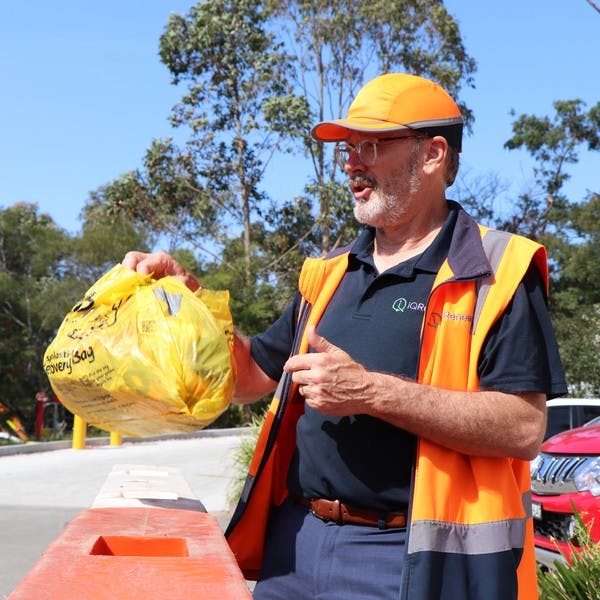Everything you need to know about recycling soft plastics
Soft Plastics includes:
Scrunchable plastics
Zip lock bags
Freezer bags
Shopping bags
Chip packets
Lolly wrappers
Biscuit wrappers
Chocolate bar wrappers
Candy bar wrappers
Biscuit packets
Crisp packets
Plastic bags
Plastic film
Shrink wrap
Plastic bread bags
Bubble wrap
Cling film
FIND A RECYCLER
Learn more about recycling soft plastics
How to recycle soft plastics
Soft plastics have traditionally been difficult to recycle, due to limitations with sorting, cleaning and collecting systems. But new technology and infrastructure is enabling more opportunities for these materials to be recycled, preventing this resource from going to landfill where it can persist for up to 1,000 years.
Soft plastics can be collected, compressed and baled on site or transported to a central recycling facility. Some businesses hire or purchase on site compacting and baling equipment to make recycling easier and cheaper.
There are a growing number of commercial facilities available to process this material across a variety of industries.?Use the directory on this page to see if there is a soft plastic recycler near you.
Always contact the recycler to check they recycle the type and amount of soft plastic you want to dispose of. For further advice on the key questions to ask a recycler, use the Choosing the Right Recycler Checklist.
Why recycle?
Plastic waste and pollution are a big problem in Australia and worldwide. It’s estimated five trillion plastic bags are used every year globally – that’s 120,000 bags every second! Each plastic bag may only be used for a few minutes before being thrown away, taking between 15 to 1,000 years to break down.
Soft plastics including plastic bags can easily be blown away from landfills and enter our environment where wildlife can become entangled in the plastic or mistake it for food. When plastics are littered in the ocean, they break down into smaller pieces and are often eaten by fish and other marine animals.
Manufacturing plastics from recycled materials also uses less energy than is required to make virgin plastic products from fossil fuels, which is a big saving for the environment.
What happens to them?
Soft plastics that are collected through specialised recycling services are sent to dedicated recyclers/re-processors. They can be physically recycled into plastic materials that can be used to make things like outdoor furniture and road infrastructure. Soft plastics can also be chemically recycled (broken down into their raw components) and used to make new plastics or used as fuel.
•Wet Processing – the film is shredded to make it more manageable, then reground and washed. Water is used to break down paper labels, loosen dirt and remove other forms of contamination. The clean, ground film is then melted and extruded to filter out any remaining impurities. The resulting pellets can then be used in the manufacturing of new plastic products.
•Dry Processing – in this process, uncontaminated film is shredded and ground without water and then extruded into pellets.
What are soft plastics?
Soft or flexible plastics are any kind of plastic item (usually packaging) that can be easily scrunched in your hand.
Common soft plastic items include:
•Magazine and newspaper wrapping
•Shrink wrap, cling wrap and plastic film
•Bubble wrap
•Plastic bags
•Pasta and rice bags
•Lolly and biscuit packets (outside package only)
•Fresh fruit and veggie bags and frozen food bags
Frequently Asked Questions
How are soft plastics recycled?
Soft plastics that are collected through specialised recycling services are sent to dedicated recyclers/re-processors. They can be physically recycled into plastic materials that can be used to make things like outdoor furniture and road infrastructure. Soft plastics can also be chemically recycled (broken down into their raw components) and used to make new plastics or used as fuel.
How long does a plastic bag take to decompose?
Lightweight single-use plastic bags (thin plastic bags that can be easily ripped) have been estimated to take 20 years to break down. Other estimates suggest plastic bags can take anywhere between 20-1,000 years to break down, depending on thickness and environmental conditions such as sunlight. In the process of decomposition, plastic bags break into microplastics, which pose a significant threat to the environment, wildlife and human health.
How much of the plastic bag can be recycled?
Single-use plastic bags are 100% recyclable, but not via your household recycling bin. Soft plastics such as plastic bags that are put in household recycling bins can contaminate other recycling and get caught in recycling machinery. Plastic bags and other kinds of soft plastics can only be recycled through specialised recycling programs that keep the materials separate and are sent to facilities that have the necessary equipment to recycle them. Check directly with your council to see if there are recycling options available in your area.








